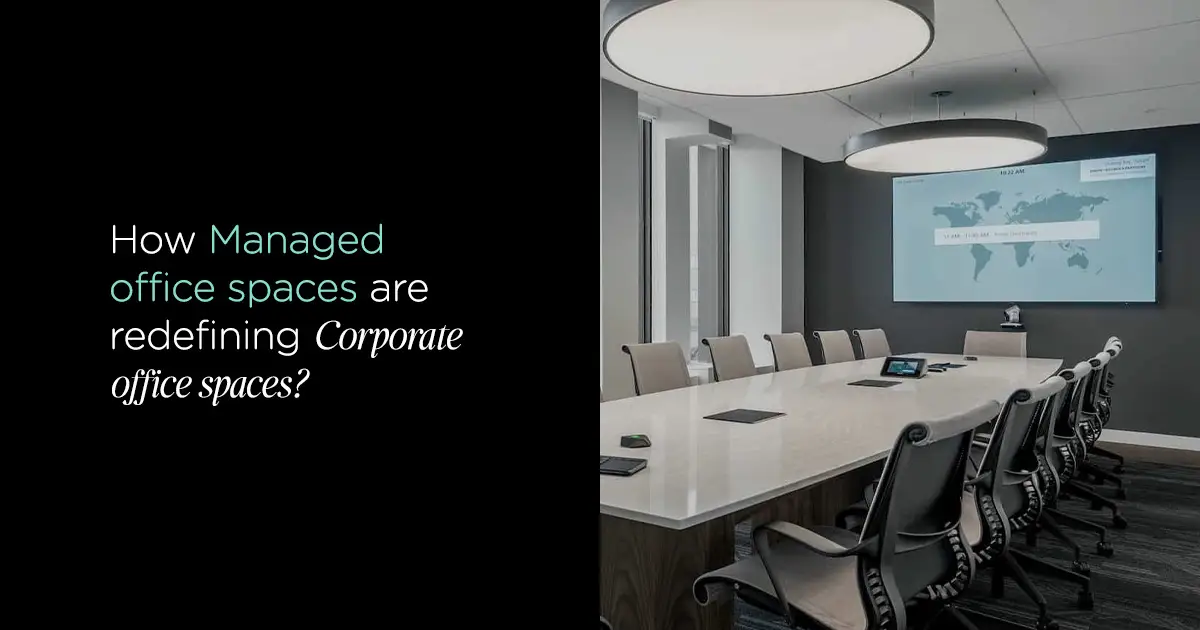
July 30, 2025
How Managed Office Spaces Are Redefining Corporate Office Spaces
Corporate real estate strategies are changing as companies seek more flexible and efficient workspace solutions. Managed office spaces have become a significant alternative to traditional office leases, with the global flexible workspace market reaching 41.4 billion U.S. dollars in 2024. These spaces offer companies fully equipped offices with professional management, eliminating the need for businesses to handle property management, maintenance, and administrative tasks. Companies can now access professional workspaces without the complexity of traditional office leasing and management.
What Are Managed Office Spaces?
Managed office spaces are fully furnished and equipped offices that are operated and maintained by professional service providers. Unlike traditional office leases, where companies handle all aspects of office management, managed spaces provide complete workspace solutions with ongoing support services.
These spaces typically include:
Furnished offices with Dedicated desks, chairs, storage, and meeting rooms
- Complete technology infrastructure including high-speed internet, phone systems, and IT support
- Reception and administrative services are handled by professional staff
- Cleaning, maintenance, and security services are managed by the operator
- Access to shared facilities like lounges, kitchens, and conference rooms
- Flexible lease terms ranging from monthly to multi-year agreements
Major providers of managed office spaces maintain locations in prime business districts across major cities worldwide, offering flexible workspace solutions to meet a wide range of business needs.
Advantages of Managed Office Spaces for Businesses
Companies are adopting managed office spaces to reduce operational complexity, lower costs, and improve workplace flexibility. The benefits include improved operational efficiency, enhanced employee experience, and cost savings.
Flexibility and Agility
Managed office spaces offer businesses the flexibility to scale operations quickly, without the constraints of traditional real estate commitments. Companies can adjust their workspace requirements based on business needs:
Rapid expansion capabilities: New locations can be operational within days rather than the months required for a traditional office setup
- Scalable team accommodation: Space can be increased or decreased monthly to match hiring patterns and project requirements
- Geographic flexibility: Companies can establish a presence in new markets without long-term lease commitments
- Project-based solutions: Temporary teams can be housed for specific durations without permanent real estate obligations
- Remote work support: Managed spaces provide professional alternatives to home offices for remote employees
Cost Efficiency
The financial benefits of managed office spaces come from shared resources and the elimination of capital expenditure. Companies can achieve significant cost reductions compared to traditional office operations:
Reduced capital investment: No upfront costs for furniture, equipment, or office setup
- Lower operational expenses: Shared costs for utilities, cleaning, security, and maintenance
- Predictable monthly costs: All-inclusive pricing eliminates budget surprises from facility management
- Elimination of facility staff: No need to hire property management, IT support, or administrative personnel
- Reduced real estate risk: No long-term lease commitments that may become burdensome during business downturns
Companies can reduce overall occupancy costs by using managed office spaces compared to traditional leases.
Enhanced Employee Experience
Managed office spaces invest heavily in creating productive and comfortable work environments. Professional management ensures consistent service quality and modern amenities:
Professional reception services: Trained staff handle visitor management, mail, and administrative tasks
- High-quality work environments: Modern interior design, ergonomic furniture, and proper lighting
- Consistent service standards: Professional cleaning, maintenance, and facility management
- Networking opportunities: Access to other businesses and professionals in shared spaces
- Work-life balance support: On-site amenities reduce time spent on administrative tasks
Modern Amenities
Managed office spaces typically offer amenities that would be expensive for individual companies to provide. These facilities enhance productivity and employee satisfaction:
Advanced meeting facilities: Video conferencing equipment, presentation tools, and various room sizes
- Wellness facilities: Fitness centres, quiet rooms, and relaxation areas
- Food and beverage services: On-site cafes, kitchens, and catering options
- Business services: Printing, copying, mail handling, and courier services
- Social spaces: Lounges, terraces, and networking areas for informal meetings
Professional Environment
Managed office providers maintain professional standards that enhance corporate image and productivity. These environments are designed to support business operations:
Prime business addresses: Prestigious locations that enhance company credibility
- Professional interior design: Modern, well-maintained spaces that impress clients and employees
- Consistent branding opportunities: Customizable spaces that can reflect the company's identity
- Security systems: Access control, surveillance, and secure storage facilities
- Compliance management: Operators ensure spaces meet health, safety, and regulatory requirements
Simplified Operations
Managed office spaces eliminate the complexity of facility management, allowing companies to focus on core business activities. Operational responsibilities are transferred to professional service providers:
Maintenance handled by operators: HVAC, plumbing, electrical, and general repairs are managed professionally.
- Cleaning services included: Daily cleaning, waste management, and supplies provided
- Security management: Access control, monitoring, and emergency procedures are handled by operators
- Vendor management: Relationships with suppliers, contractors, and service providers are managed centrally
- Administrative support: Reception, mail handling, and visitor management provided
Access to Advanced Technology
Managed office spaces provide enterprise-grade technology infrastructure that would be expensive for individual companies to implement and maintain:
High-speed internet: Redundant fibre connections with guaranteed uptime and bandwidth
- Advanced phone systems: VoIP systems with features like call forwarding, voicemail, and conference calling
- IT support services: On-site technical support for connectivity, equipment, and software issues
- Security technology: Keycard access, surveillance systems, and alarm monitoring
- Cloud services: Access to shared resources and business applications
- Video conferencing: Professional-grade equipment for remote meetings and presentations
Strategic Locations
Managed office providers secure prime real estate in central business districts and commercial hubs. This provides companies with access to prestigious locations without the challenges of direct leasing:
Central business district presence: Locations in major financial and commercial centres
- Transportation accessibility: Proximity to airports, train stations, and major highways
- Client accessibility: Easy access for customers, partners, and stakeholders
- Talent recruitment: Attractive locations that appeal to skilled professionals
- Business ecosystem: Proximity to other businesses, services, and networking opportunities
The location advantage is particularly valuable for companies expanding into new markets, as managed office providers have established relationships with landlords and deep knowledge of local real estate markets.
Conclusion
Managed office spaces are changing corporate real estate strategies by providing flexible, cost-effective, and professionally managed workspace solutions. Companies benefit from reduced operational complexity, lower costs, and better employee experiences while maintaining access to prime business locations and modern amenities. As business models continue to evolve and remote work becomes more prevalent, managed office spaces offer corporations the ability to adapt quickly to changing requirements. The growing adoption of these spaces reflects a shift toward viewing the workspace as a service rather than a fixed asset, enabling companies to focus resources on core business activities while maintaining professional work environments




